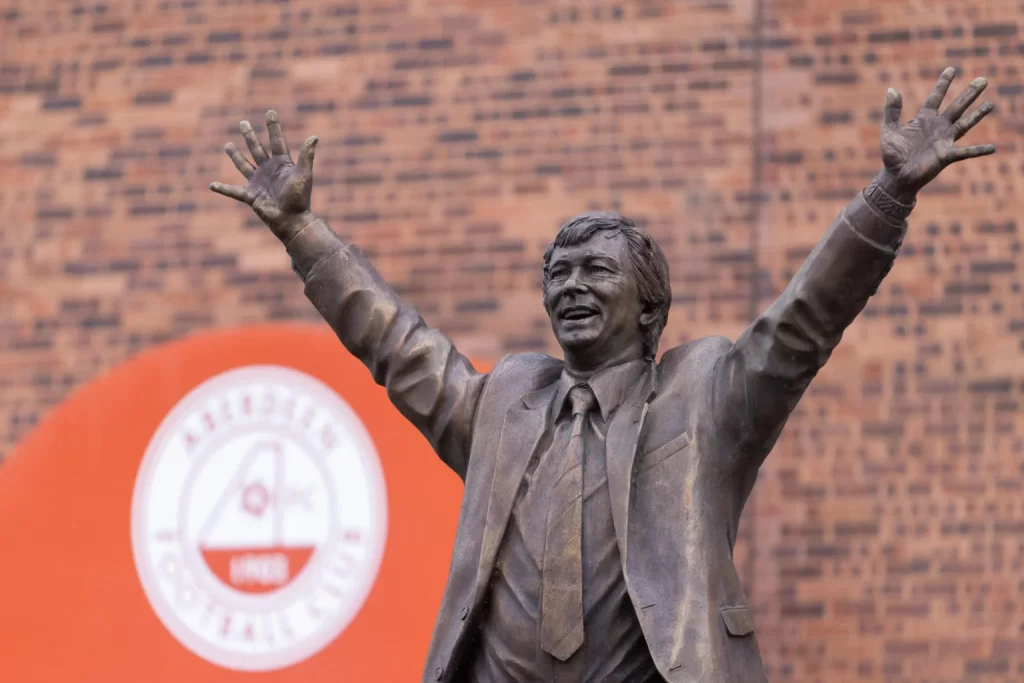The Untold Story of Sir Alex Ferguson’s Unyielding Commitment Before Manchester United
When we think of Sir Alex Ferguson, we envision a managerial genius who transformed Manchester United into one of the world’s most successful football clubs. But what if things had been different? What if Sir Alex had taken up offers from other clubs before United came knocking? In the mid-1980s, three prominent clubs made persuasive offers to Ferguson, all of which he rejected. These decisions were not based on the lack of prestige or opportunity—one club even matched his ambitions in many ways—but rather stemmed from a deeply personal belief that shaped his career forever. In this article, we dive deep into the reasons behind his resolute stance, the clubs he could have managed, and why his story might have turned out differently had it not been for one guiding principle.
Before Manchester United came into the picture, Ferguson was already making waves in European football. His success with Aberdeen, leading them to unprecedented victories against top clubs like Real Madrid in the European Cup Winners’ Cup, attracted the attention of several European giants.
One of the first clubs to knock on Ferguson’s door was a top-tier team from continental Europe. With offers of a significant budget and the chance to dominate internationally, many assumed Ferguson would jump at the opportunity. After all, he had already proven his abilities on the Scottish stage, and the offer seemed like the perfect next step. However, Ferguson didn’t take the bait. Instead, he remained resolute, insisting that his goals were more aligned with a long-term project—something deeper than just chasing trophies.
What made Sir Alex turn down an offer that could have propelled him into the international spotlight years before he found fame with United?
Ferguson’s deep connection to Scottish football wasn’t just professional—it was personal. Born in Govan, Glasgow, Ferguson had a sense of pride that came with representing his homeland. His managerial career had begun in Scotland, and he was deeply invested in the development of Scottish football.
Even though bigger and wealthier clubs came calling, Ferguson felt a duty to continue nurturing the footballing landscape of Scotland. At Aberdeen, he wasn’t just winning matches—he was creating a legacy that other Scottish clubs could aspire to. His triumphs there gave Scottish football a new sense of pride, and turning his back on that felt like abandoning his mission.
Loyalty is rare in football, especially when top-tier clubs come knocking. So, why did Sir Alex Ferguson put national pride before personal ambition?
Closer to home, two major English clubs presented Ferguson with lucrative offers. Both clubs had history, financial resources, and the potential to compete for the highest honors in English football. These weren’t just any teams—they were top-tier English clubs with fan bases hungry for success.
For most managers, this would have been an offer too good to refuse. English football was on the rise, and these clubs represented a golden opportunity. But Ferguson rejected both without hesitation. His reasoning? He didn’t just want to manage a team that needed short-term fixes—he wanted to build something from the ground up. He envisioned a club where he could mold the entire system, from youth development to the first team. These English clubs didn’t meet that criteria, and Ferguson wasn’t willing to compromise on his vision.
Could Ferguson’s decision to pass on these English powerhouses have changed the trajectory of football history?
One of the defining characteristics of Sir Alex Ferguson’s managerial approach was his insistence on building a club rather than simply inheriting or buying success. This was a core reason behind his rejection of multiple offers. Ferguson wasn’t interested in stepping into an already established system and trying to maintain or tweak it. He wanted to leave a lasting imprint—a dynasty that would carry on long after his departure.
Ferguson’s belief in youth development and long-term vision was a major factor. He wanted to work with young players, build them up from within the club’s ranks, and establish a culture that promoted hard work, discipline, and excellence. Many clubs didn’t align with this philosophy, focusing more on short-term gains and instant success. Ferguson was willing to wait for the right project, which eventually led him to Manchester United.
How did Ferguson’s unique managerial philosophy set him apart from other managers of his era, and why was it so important to him?
When Manchester United came knocking in 1986, Ferguson knew it was different. The club was struggling, having gone two decades without winning a league title, but Ferguson saw potential. Unlike the other offers he had rejected, United presented an opportunity to build a footballing empire from the ground up. The youth academy, the club’s history, and the passionate fan base aligned perfectly with Ferguson’s vision of creating a lasting legacy.
At Old Trafford, Ferguson found the platform he had been waiting for. It wasn’t just about winning trophies—it was about revitalizing a club, creating a dynasty, and instilling a culture of winning that would last for decades. He embraced the challenge, knowing that Manchester United was the club where he could truly fulfill his ambitions.
Was Manchester United’s offer the culmination of everything Ferguson had been waiting for, or was it a calculated risk that could have gone wrong?
Sir Alex Ferguson’s career could have gone in many different directions. He had offers from top European clubs, English powerhouses, and many other tempting opportunities. Yet, he never budged on his stance. His determination to find the perfect fit—where he could build something long-lasting—was ultimately the reason he chose Manchester United. And the rest, as they say, is history.
Through his choices, Ferguson taught us a valuable lesson in patience, vision, and sticking to one’s principles. His success wasn’t accidental—it was the result of careful planning, a long-term mindset, and an unyielding belief in his own philosophy. Had he chosen differently, the football world as we know it might have been entirely different. Today, we celebrate the legacy of Sir Alex Ferguson, not just for what he achieved at Manchester United, but for the unwavering commitment to his ideals that made it all possible.



